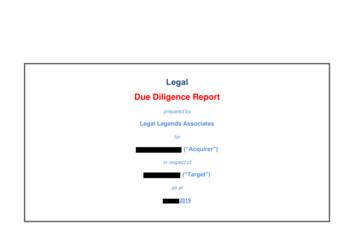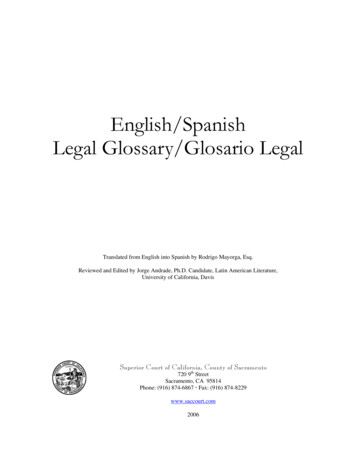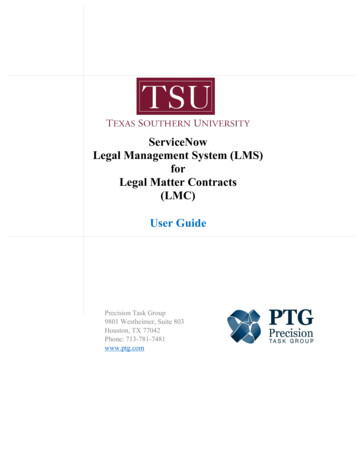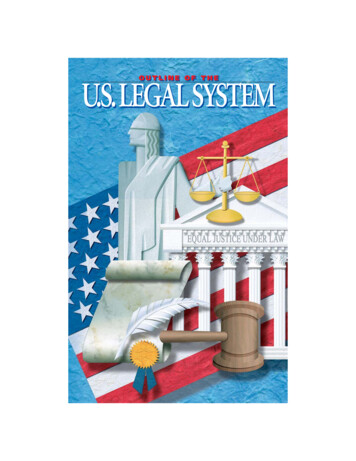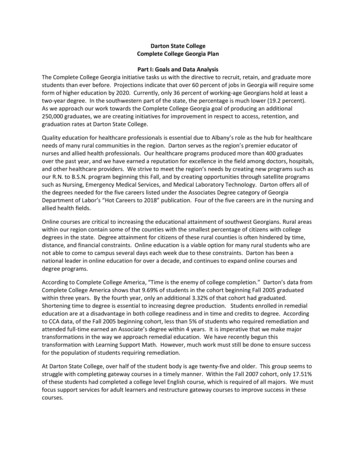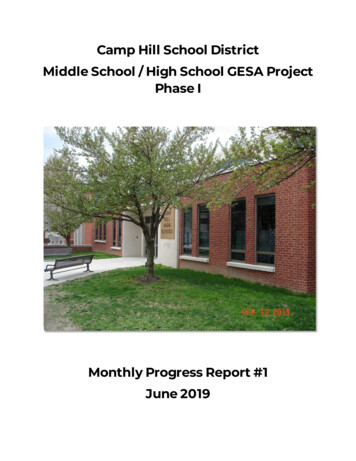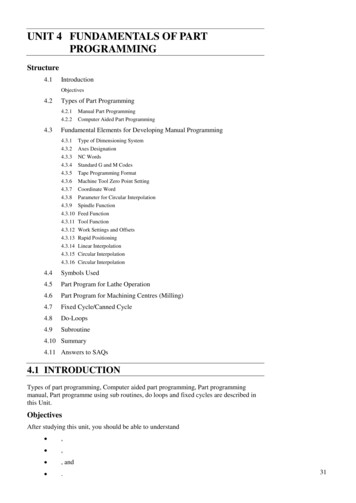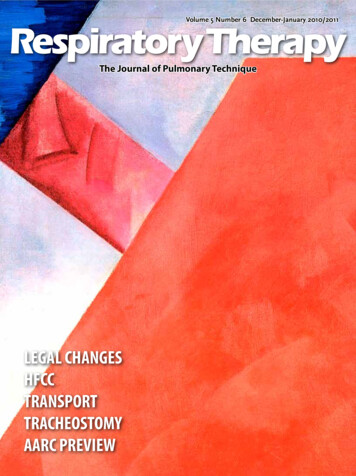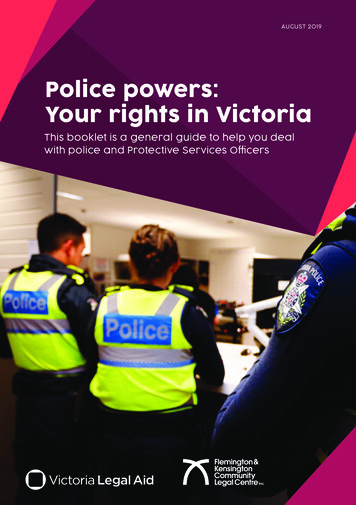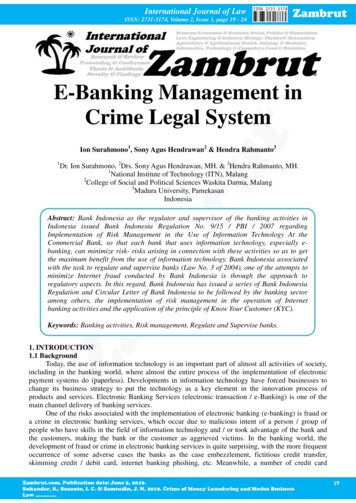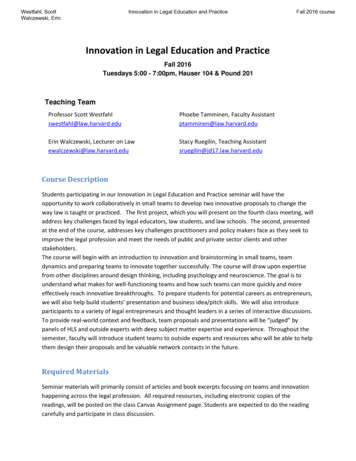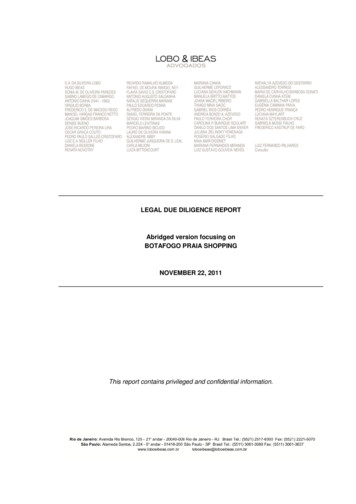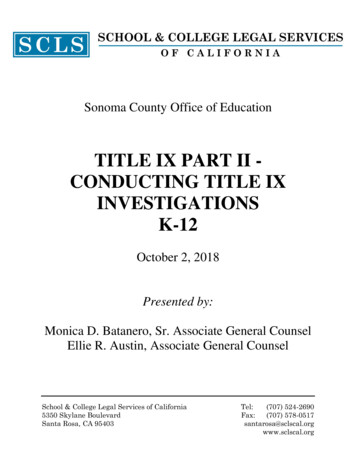
Transcription
Sonoma County Office of EducationTITLE IX PART II CONDUCTING TITLE IXINVESTIGATIONSK-12October 2, 2018Presented by:Monica D. Batanero, Sr. Associate General CounselEllie R. Austin, Associate General CounselSchool & College Legal Services of California5350 Skylane BoulevardSanta Rosa, CA 95403Tel:(707) 524-2690Fax:(707) 578-0517santarosa@sclscal.orgwww.sclscal.org
Monica D. BataneroSenior Associate General Counselmbatanero@sclscal.orgAreas of ExpertiseGeneral Education Code & Student Issues (includingstudent discipline, interdistrict transfers; generalstudent issues, student’s and parent’s rights);Governance (Brown Act, Public Record Acts,conflicts); Special Education/Section 504ExperienceMs. Batanero has over 14 years of experience in administrative law; over 10 years of experiencein education law. Ms. Batanero’s practice touches upon myriad legal issues relating to studentsand school personnel. She advises school districts, county offices of education and specialeducation local plan areas statewide regarding all aspects of special education law, studentdiscipline and anti-discrimination laws. In addition to regularly participating in IEP meetings,Ms. Batanero has represented clients before the Office of Administrative Hearings, theCalifornia Department of Education and the Office for Civil Rights. Ms. Batanero also assistsschool districts in negotiating agreements and reaching settlements with parents regardingspecial education issues. Ms. Batanero also assists school districts and County Boards ofEducation at all levels of the student discipline process and conducts investigations on behalf ofher clients of allegations of discrimination. Prior to joining SCLS, Ms. Batanero worked ineducation law in Southern California representing school districts in special education mattersas well as addressing various legal matters as they arose. Ms. Batanero is a Member of theCalifornia State Bar and the California Council of School Attorneys.EducationJuris Doctorate, University of San Francisco School of Law (2003); Master of Science inGerontology, University of Southern California (1999); Bachelor of Science in Gerontology,University of Southern California (1998).School and College Legal Services (SCLS) is a joint powers authority serving schooldistricts, county offices of education, SELPAs, and community colleges in over fifteen counties inNorthern California. Our primary focus, as a preventative law firm, is helping clients avoidfuture costly legal problems. We are a collaborative office, working to ensure our clients receivethe most legally defensible advice in the most efficient manner possible.5350 Skylane Boulevard Santa Rosa, CA 95403 (707) 524-2690Fax: (707) 578-0517 www.sclscal.org
Ellie R. AustinAssociate General Counseleaustin@sclscal.orgAreas of ExpertiseCollective BargainingPersonnelTitle IX & the Clery ActWebsite AccessibilityExperienceMs. Austin’s practice focuses on collective bargaining negotiations and personnel matters.She assists school districts, county offices of education, and community college districts innegotiating collective bargaining agreements, resolving grievances and unfair practicecharges, and handling personnel matters. Ms. Austin also assists clients with Title IX andClery Act compliance, as well as investigations of alleged discrimination or harassment.Prior to joining SCLS, Ms. Austin practiced special education law representing public schooldistricts at a law firm in Southern California for over 3 ½ years, where she workedextensively on matters pending before the California Office of Administrative Hearings. Shedeveloped expertise in analyzing special education documents, including IEPs,multidisciplinary assessments, and transition plans, for legal compliance. While in lawschool, she interned at a human rights NGO in Thailand teaching English to refugee womenand Thai schoolchildren. Her capstone project for her M.P.A. degree involved a qualitativeresearch study which identified common barriers facing community college students inOregon as they transferred to four-year institutions.EducationB.A. Humboldt State University, Geography magna cum laude (2007)J.D. Drexel University School of Law (2011)M.P.A. University of Oregon (2016)School and College Legal Services (SCLS) is a joint powers authority serving schooldistricts, county offices of education, SELPAs, and community colleges in over fifteencounties in Northern California. Our primary focus, as a preventative law firm, is helpingclients avoid future costly legal problems. We are a collaborative office, working to ensureour clients receive the most legally defensible advice in the most efficient mannerpossible.5350 Skylane Boulevard Santa Rosa, CA 95403 (707) 524-2690Fax: (707) 578-0517 www.sclscal.org
Title IX Part II – Conducting Title IX InvestigationsK-12October 2, 2018PagePresentation Slides . 11.Legal Update 22-2017: OCR Withdraws Significant Title IX Guidance;Issues New Dear Colleague Letter and Q&A on Title IX, October 2017 . 282.OCR Revised Sexual Harassment Guidance: Harassment of StudentsBy School Employees, Other Students, or Third Parties, January 2001 . 413.Sample Uniform Complaint Procedures Case Log . 894.Investigation Tracking Document . 905.EEOC Enforcement Guidance . 916.5 CCR § 4631 - Responsibilities of the LEA . 947.5 CCR § 4964 - Confidentiality . 968.Case Study . 979.5 CCR § 4963 - Prohibitions . 9810.Investigation Notice Form . 99These materials have been prepared by School & College Legal Services of California for informational purposes only andare not intended to constitute legal advice. Application of the law may vary depending on the particular facts andcircumstances at issue. Persons receiving this information should not act on it without seeking professional counsel. Thisinformation is not intended to create and does not constitute an attorney-client relationship between parties. 2018 School and College Legal Services of CaliforniaAll rights reserved. However, SCLS grants permission to any current SCLS client to use, reproduce, and distribute thesematerials in its entirety for the client’s own non-commercial purposes.
Title IX Part II:Conducting Title IX InvestigationsOctober 2, 2018Presented by:Monica D. Batanero, Sr. Associate General CounselEllie R. Austin, Associate General CounselSchool & College Legal Services of Californiawww.sclscal.org 1Agenda Workshop seriesBrief overview of Title IXConducting impartial investigationsAppropriate remedies and sanctionsLegally compliant investigation reportsNext stepswww.sclscal.org 2Fall 2018Title IX Workshop Series at SCOE Part 1 – Title IX Coordinator Essentials, September 19,2018 Part 3 – Nuts and Bolts of the Title IX Coordinator’s Role,November 14, 2018 Part 4 – CCD Only – Additional Title IX Challenges forCommunity Colleges, December 11, 2018www.sclscal.org 3 2018 www.sclscal.org1
I. Brief Overview of Title IXwww.sclscal.org 4What is Title IX?“No person in the United States shall, on the basis ofsex, be excluded from participation in, be denied thebenefits of, or be subjected to discrimination under anyeducational program or activity receiving federalfinancial assistance.”20 U.S.C. § 1681 and 34 C.F.R. Part 106www.sclscal.org 5Where Does Title IX Apply? Title IX protects students in connection with allacademic, educational, extracurricular, athletic, andother programs of the district. Programs can take place in a district facility, on aschool bus, at a program sponsored by the district atanother location, or on a school-sponsored field trip.www.sclscal.org 6 2018 www.sclscal.org2
Requirements Under Title IX Once an institution knows or reasonably should knowof sex discrimination, it must: Investigate End the discrimination Prevent discrimination from occurring again Procedural requirements: Adoption of certain policiesAdoption and publication of grievance proceduresDesignation of a Title IX CoordinatorFair and equitable investigations and proceedingswww.sclscal.org 7Responsible Employees A “responsible employee” is any employee: Who has the authority to take action to redress sexualharassment; Who has been given the duty of reporting incidents of sexualharassment to the Title IX Coordinator/designee; or Whom a student could reasonably believe has this authorityor duty. When a “responsible employee” knows or should haveknown of sexual harassment/discrimination, the districtmust take certain steps.www.sclscal.org 8II. Conducting Impartial Investigationswww.sclscal.org 9 2018 www.sclscal.org3
What is an Investigation? An investigation includes both the fact-finding anddecision-making processes (excluding appeals) It is the process by which school determines: Whether or not the conduct occurred If it did occur, whether the conduct is sufficiently serious If it is, what actions are necessary to: end the discrimination, eliminate the hostile environment, and prevent its recurrencewww.sclscal.org 10Legal Requirements Under Title IX A Title IX investigation must be: Prompt Thorough Impartial It may, but is not required to, include a hearing It must include the opportunity for both the complainantand the respondent to offer evidence No fixed time frame – follow your grievance procedures School must make a “good faith effort” to conduct a “fair,impartial investigation” in a “timely manner”www.sclscal.org 11Investigations Will Vary by Institution The specific steps in a recipient’s Title IX investigationwill vary depending on: Nature of the allegation(s)Source of the complaintAge of student(s) involvedSize and administrative structure of schoolState or local legal requirements (such as mandatoryreporting or Title 5 regulations) Lessons learned from past experienceswww.sclscal.org 12 2018 www.sclscal.org4
Investigations Will Vary by Institution Investigations may include: Conducting interviews Complainant Respondent* Other witnesses Reviewing student and personnel files Reviewing law enforcement documents, if applicable Gathering and examining other relevant documents orevidence Hiring an outside investigatorwww.sclscal.org 13Investigation Fundamentals:First Steps1. Review the applicable procedure Enter the case into a complaint log Map out the steps and timeline for the investigation based onthe procedure Make sure required notices are sent, including copies of theapplicable procedure and other information required by theprocedure2. Develop an investigative strategy Outline scope and breadth of investigation Determine who should be interviewed and what informationshould be reviewedwww.sclscal.org 14Investigation Fundamentals:Next Steps3. Determine who will be part of the investigation team District employees Outside investigators4. Conduct the investigation Begin promptlyDetermine who should be interviewed, and in what orderBegin interviews with core people and broaden as neededBefore interviewing, outline interview questions, includingelements of a particular complaint Before interviewing, review related documents/recordswww.sclscal.org 15 2018 www.sclscal.org5
Investigation Fundamentals, cont’d.4. Conduct the investigation, cont’d Prepare for interviews by identifying the followingelements: Identity of interviewer Identity of person to be interviewed Location, date, and time of interview Conduct interview in confidential setting Make arrangements to record interviews, if possible California law requires informed consent of witness (632P.C.) Once recorder is on, state date, time & place of interview,name of participants and have witness confirm on tapehis/her knowledge of & consent of the recordingwww.sclscal.org 16Investigation Fundamentals, cont’d Should be looking for each element of the type ofdiscrimination at issue Did unlawful conduct occur? Was each prong of the allegation met? Unlawful discrimination (1) Unwelcome conduct that is(2) sufficiently severe or pervasive to(3) (a) significantly interfere with the employee’s/student’sjob/academic performance OR(b) create an intimidating, hostile or abusiveworking/academic environmentwww.sclscal.org 17Title IX Investigation Procedures:Standards of Evidence 2017 Title IX guidance gives districts the ability to choosebetween two standards: Preponderance of the Evidence (50.1%) More likely than not Clear and Convincing Evidence ( 75%) Substantially more likely than notwww.sclscal.org 18 2018 www.sclscal.org6
Notice of Investigation Once a school decides to investigate conduct that maylead to disciplinary action, school must provide writtennotice to respondent, including: Allegations constituting a potential violation of school policy Sufficient details of allegations: Identity of the parties involvedDate(s) and location(s) of alleged incident(s)Section(s) of the code allegedly violatedThe precise conduct allegedly constituting the potentialviolation Must be provided a sufficient time in advance of theinterview to allow respondent to prepare a responsewww.sclscal.org 19Interviews Make appropriate disclosures (e.g., who youare, who you represent, why you are there) Explain that district is required to investigateallegations of [sexual harassment, sexualviolence, sex discrimination] and takeappropriate actionState that no conclusions have been made and retaliation isprohibitedTry to put interviewee at ease (use trauma-informed guidelines)Emphasize the expectation of best recollection and truthfulanswersStart with broad/overview questionswww.sclscal.org 20Interviews Have interviewee describe the incident(s)/conduct inhis/her own words 5 W’s – who, what, when, where, why Ask if interviewee has told interviewer everything he/she canremember After each answer, ask: “is there anything else?” Ask follow up questions, including questions to confirmchronology of events, to fill in any gaps in the 5 W’s Don’t offer information or provide answers Ask about knowledge of any relationships betweencomplainant & alleged wrong-doer or possiblemotivations for complaint or conduct at issuewww.sclscal.org 21 2018 www.sclscal.org7
Interviews Ask about and for copies of any relevant documents, texts,emails, photos, social media posts, etc. At the end of the interview: Ask whether there is anyone else the interviewee thinksshould be interviewed about the incident/conduct Provide your contact information and advise the intervieweeto contact you with any additional information Give the interviewee a copy of the relevant procedure Caution against retaliation Remind the interviewee to maintain confidentiality Advise interviewee you may need to follow-up with him/heras investigation proceedswww.sclscal.org 22Interviews Be an active listener & critical thinker “Does this make sense?” “Do I understand exactly what happened?” “Will the person reading my report understand exactly whathappened?” Use your time line to identify discrepancies betweenwitness’ own story & that of others - challenge factswww.sclscal.org 23Interviews Clarify basis for witness’ knowledge of a “fact” How do they know? Saw it? Heard it? Was involved in it? Distinguish between “no” & “I cannot recall.” Document carefully for later reviewwww.sclscal.org 24 2018 www.sclscal.org8
Interviews: Assessing Credibility Investigators should take into account all relevantevidence in determining witnesses’ credibility Should not rely solely on eye-witness accounts, tangiblephysical evidence, or an admission to corroborate eitherparty’s storywww.sclscal.org 25Interviews: Assessing Credibility Factors to consider: Changes in behavior of the complainantComplainant telling another person about the discriminationOther complaints against same respondentWitnesses’ conduct during interviews, including body language,eye contact, tone, nervous behaviors, sweating Consistent/inconsistent information Corroboration by other witnesses, documents, or other evidence How much detail did witness offer? Factors that aren’t as relevant: a delay in reporting, minorinconsistencies in story, that complainant and respondent oncehad a consensual relationshipwww.sclscal.org 26Hot SeatWhich of the following is appropriate to consider in acredibility determination?1.2.3.4.5.6.7.8.Respondent says, “She was asking for it. Just look at what she was wearing!”The complainant drops out of sports and drama club and starts missing schoolfrequently.Respondent’s witness says, “He’s such a good kid. I know he could never do whatshe’s accusing him of.” [sexual harassment investigation]Respondent says, “It was an accident. I didn’t do it on purpose.” after putting hishand on a male student’s crotch.Complainant writes in her journal after the assault about how the assault hasimpacted her.Complainant tells his best friend that he’s been harassed by a football player for thepast 3 months.Respondent says, “We used to date. I know he’s okay with us fooling around.”You’re the investigator. You diligently try to contact complainant to set up a time tointerview her. She does not reply to your many overtures. When you try to approachher personally, she avoids you. When you finally get in touch with her, she says shedoesn’t want to be involved.www.sclscal.org 27 2018 www.sclscal.org9
Interviewing the Complainant Must be provided sufficient written notice in advance of anyinterview to prepare for meaningful participation Ask complainant specifically: Has anything like this ever happened before? Use 5 W’s The nature and past history of any relationship betweencomplainant and respondent Whether complainant has previously complained about therespondent, and if so, to whom Whether anyone else knew of or joined in conduct complained of Whether complainant is aware of other incidents by respondenttoward other individuals Whether any documents exist to support the allegationswww.sclscal.org 28Interviewing the Respondent Must be provided sufficient written notice (including thespecific allegations) in advance of any interview toprepare for meaningful participation Verify that no determinations of wrongdoing have beenmade and that he/she will have a full opportunity toprovide information Caution against retaliation The respondent (and complainant) should be allowed tohave a representative presentwww.sclscal.org 29Interviewing the Respondent, cont’d. Provide respondent a copy of applicable complaintprocedures and explain district’s obligation to investigatecomplaints Ascertain: Whether respondent agrees with statements/allegations ofcomplainant and other witnesses already interviewed Whether any witnesses or other evidence exists that couldcorroborate respondent’s version of events The nature and past history of any relationship betweencomplainant and respondent Whether respondent knows if complainant has previouslymade complaints of a similar nature about respondent orotherswww.sclscal.org 30 2018 www.sclscal.org10
Interviewing Other Witnesses Advise witness to keep matter confidential Discuss prohibition against retaliation If witness is a minor, notify parent/guardian of needto interview minor Identify the relation of witnesses to t
School & College Legal Services of California Tel: (707) 524-2690 5350 Skylane Boulevard Fax: (707) 578-0517 Santa Rosa, CA 95403 santarosa@sclscal.org www.sclscal.org Sonoma County Office of Education . TITLE IX PART II - CONDUCTING TITLE IX INVESTIGATIONS . K-12. October 2, 2018. Presen
